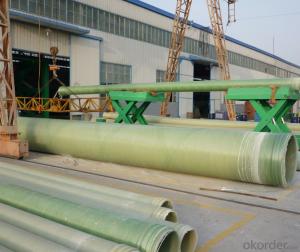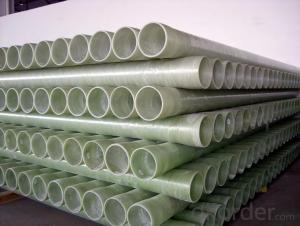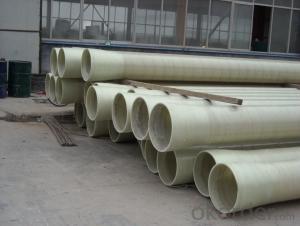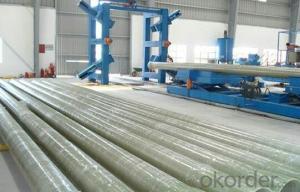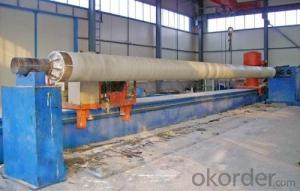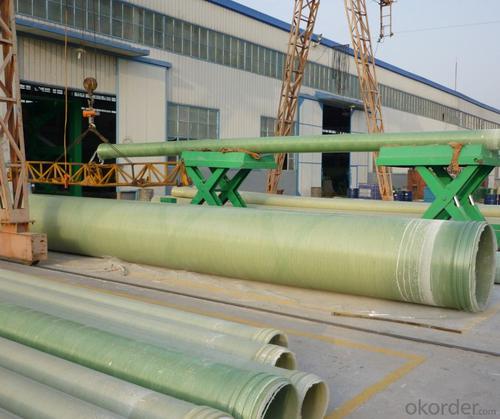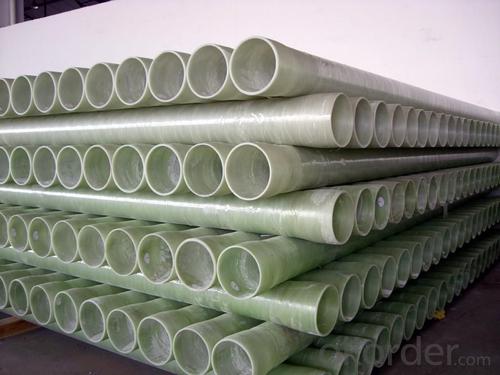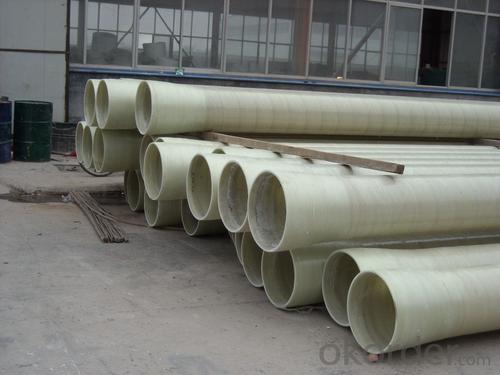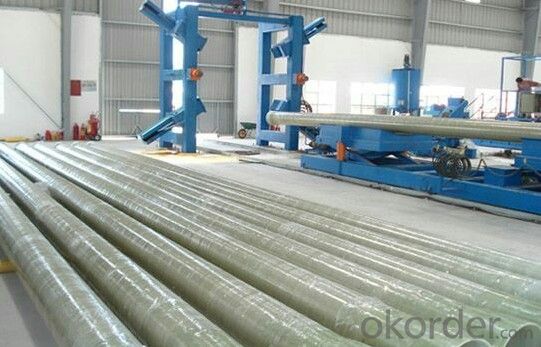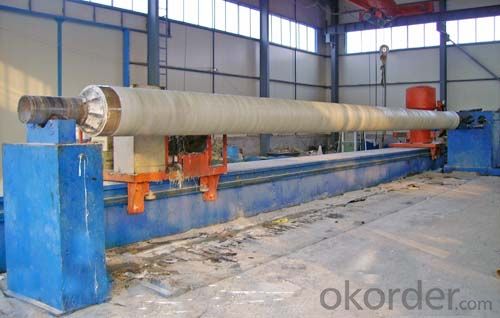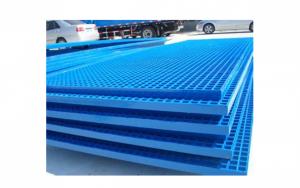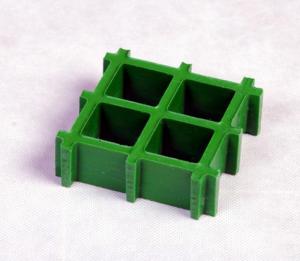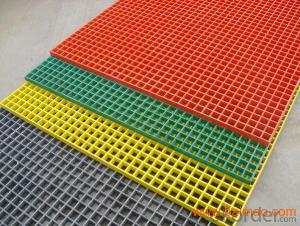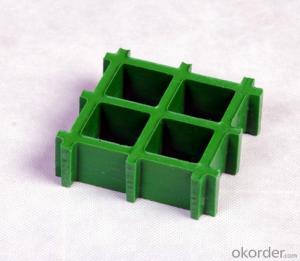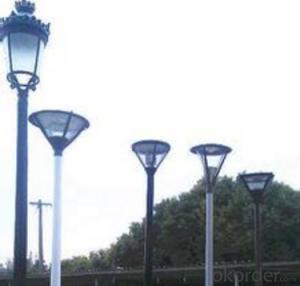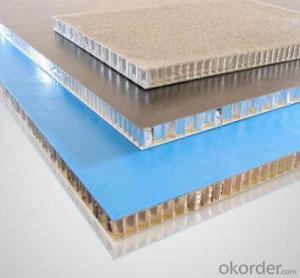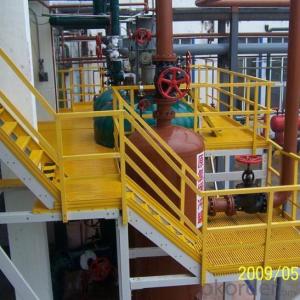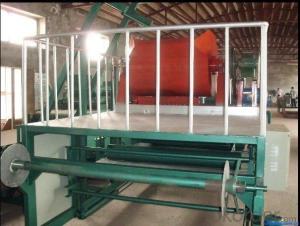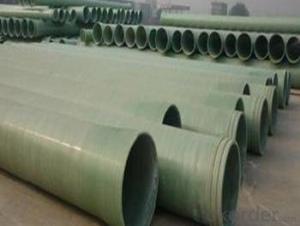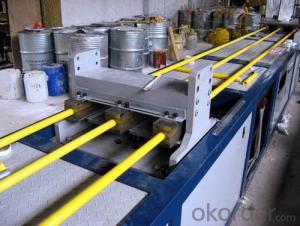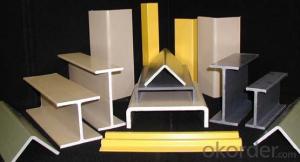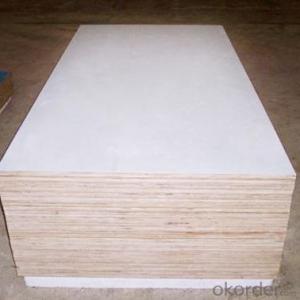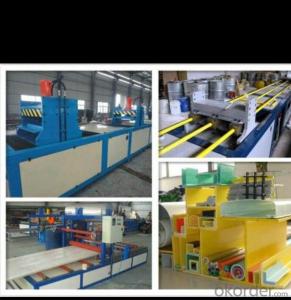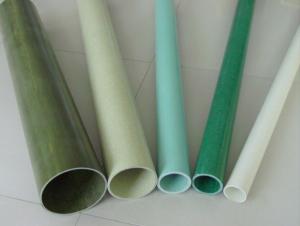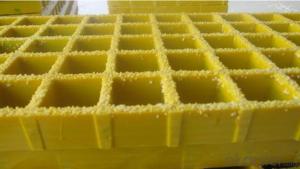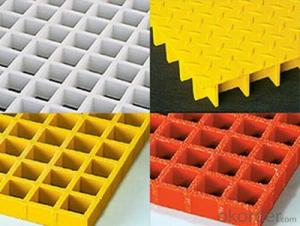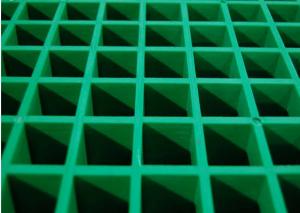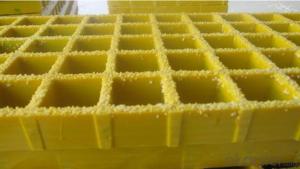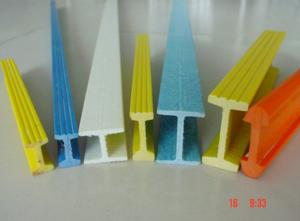FRP Pultrusion Profiles - Lightweight and High Strength FRP Pipes
- Loading Port:
- Tianjin
- Payment Terms:
- TT OR LC
- Min Order Qty:
- 2000 m
- Supply Capability:
- 30000 m/month
OKorder Service Pledge
OKorder Financial Service
You Might Also Like
Specification
PRODUCT DESCRIPTION
1.PIPE INTRODUCTION
It is the ideal product for the transportations of the chemicals, drinking water, waste water, waste gas and sewer.
2.CHARACTERISTICS
• Corrosion resistance High mechanical property
• Low friction coefficient
• Light weight
• Non toxic
• Maintenance free
• Long life span
3.PRODUCTION RANGE
Any type and specification RPMP of diameter DN400-DN4000 and pressure PN0.25-PN2.5MPa can be produced. Also, we can provide the customized product according to user’s specific requirements.
4.APPLICATION
Due to its own advantages, the RPMP is used extensively in the city engineering water supply and drainage, the water supply and the drainage or the recycle water in the electric factory, the waste water treatment, the oil chemical industry and so on.
TECHNICAL DATA
Stiffness | SN3750 | SN5000 | SN10000 | ||||||
Pressure | 0.25 | 0.6 | 1.0 | 0.25 | 0.6 | 1.0 | 0.25 | 0.6 | 1.0 |
400 | 6.1 | 6.1 | 5.9 | 6.7 | 6.7 | 6.4 | 8.1 | 8.1 | 7.87 |
500 | 7.2 | 7.2 | 7.1 | 8 | 8 | 7.7 | 11.4 | 9.6 | 9.4 |
600 | 8.7 | 8.3 | 8.3 | 9.6 | 9.6 | 9.2 | 12.1 | 11.7 | 11 |
700 | 9.7 | 9.7 | 9.4 | 11.2 | 11.2 | 10.4 | 13.8 | 13.2 | 12.5 |
800 | 11.6 | 11.3 | 10.6 | 12.8 | 12.5 | 11.7 | 15.5 | 15 | 14.2 |
900 | 13.4 | 12.5 | 11.7 | 14.8 | 13.8 | 12.9 | 19.3 | 16.4 | 15.8 |
1000 | 14.6 | 13.7 | 13 | 16.2 | 15.1 | 14.4 | 20.7 | 18 | 17.3 |
1100 | 16.1 | 14.9 | 14.2 | 17.9 | 16.5 | 15.6 | 23 | 19.8 | 18.9 |
1200 | 17.2 | 16.1 | 15.4 | 19.6 | 17.9 | 16.9 | 24.7 | 21.5 | 20.6 |
1400 | 20.4 | 18.4 | 17.7 | 22.7 | 20.5 | 19.5 | 29.2 | 24.8 | 23.8 |
1500 | 22 | 19.9 | 18.7 | 24.4 | 22.1 | 20.7 | 31.4 | 26.3 | 25.3 |
COMPANT DESCRIPTION
CNBM,China National Building Materials Group is a state owned enterprise in charge of administrative affairs in china building materials industry. Established in 1984, CNBM is a large group corporation of building materials with total assets of 25 billion RMB and a total staff of 30,000.CNBM now owns 200 subordinating firms of solely owned and joint-venture companies.
CNBM International Corporation is one subsidiary of CNBM, we focus on offering good-quality products,professional service and complete solution to our customers. Strong delivery capacity, advanced technology& management, strong financing capability and excellent after-sale service are our advantages in sharing international market.
PACKAGING & DELIVERY
1.PACKAGING DETAILS:
standard packing or your requirement
2.DELIVERY DETAIL:
Shipped in 30 days after payment
FAQ
Q1.What's your sample policy?
A:We can supply the sample if we have ready parts in stock, but the customers have to pay the courier cost.
Q2.Can you produce according to the samples?
A: Yes, we can produce or modify the products according to your request.
Q3.How do you deliver the goods to my country?
A:We can provide international express, such as DHL, EMS, UPS, FedEx, etc. We select air freight and sea freight upon your requests. Quotations if without mentioning the shipping costs are shipping fee excluded.
Q4.How much does it cost to ship to my country?
A:When you goanna to place an order, please contact us, because different country has different freight.
Q5.How to get the catalogue?
A:please contact us and tell us what you are looking for.
We will try our best to meet customers' demands. Welcome you come here to visit us. We sincerely welcome partners around the world to establish business cooperation with us on the basis of mutual trust, benefit and development.
PICTURES
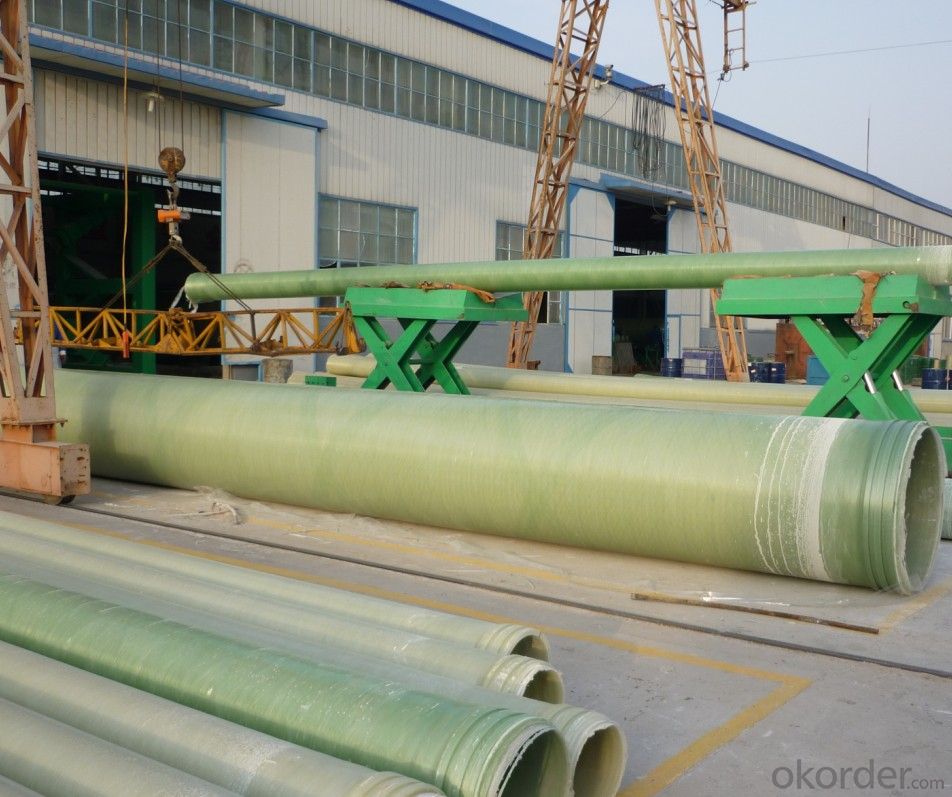
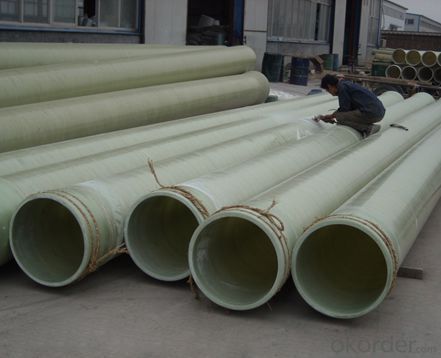
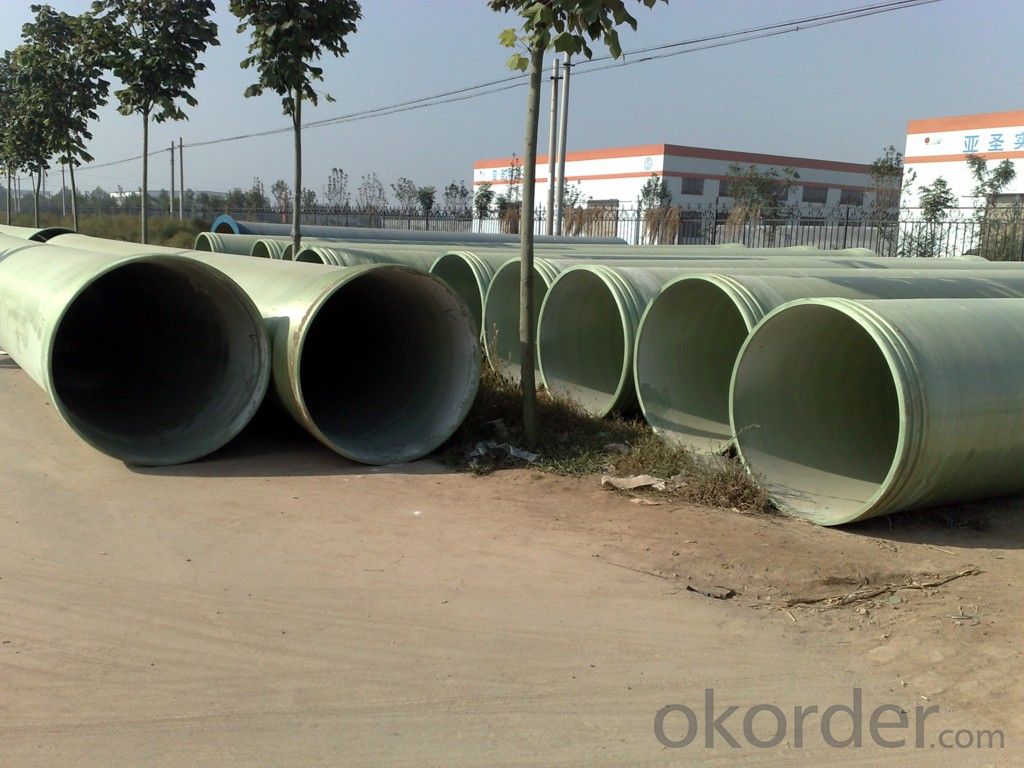
- Q: Are FRP pultrusion profiles resistant to alkaline substances?
- FRP pultrusion profiles are known for their general resistance to alkaline substances. By using fiberglass reinforced polymer (FRP) in pultruded profiles, they acquire excellent resistance against a wide range of chemicals, including alkaline substances. The manufacturing process typically involves using a thermosetting polymer, such as polyester or vinyl ester, as the resin. This choice of resin ensures high resistance to alkaline solutions. Additionally, the fiberglass reinforcement adds strength and durability to the profiles, making them highly resistant to corrosion and degradation caused by alkaline substances. However, it is important to note that the specific resistance of FRP pultrusion profiles to alkaline substances may vary depending on the resin formulation and manufacturing process used. Therefore, it is advisable to consult the manufacturer or supplier to confirm that the profiles meet the specific resistance requirements for alkaline environments.
- Q: Are FRP pultrusion profiles resistant to impact from heavy machinery?
- Yes, FRP pultrusion profiles are highly resistant to impact from heavy machinery due to their inherent strength and durability. The strong composite materials used in their construction, such as fiberglass reinforced polymers, provide excellent impact resistance, making them a reliable choice for applications where heavy machinery might be involved.
- Q: Are FRP pultrusion profiles suitable for the manufacturing of chemical pumps?
- Yes, FRP pultrusion profiles are suitable for the manufacturing of chemical pumps. FRP (Fiber Reinforced Polymer) pultrusion profiles offer several advantages that make them ideal for use in chemical pump manufacturing. Firstly, FRP pultrusion profiles are highly corrosion-resistant. Chemical pumps are frequently exposed to corrosive chemicals, which can cause damage and deterioration to traditional metal pump components. However, FRP pultrusion profiles are made from a combination of fiber reinforcements and a polymer resin matrix, which makes them highly resistant to corrosion from various chemicals. This makes FRP pultrusion profiles an excellent choice for ensuring the longevity and durability of chemical pumps. Secondly, FRP pultrusion profiles have excellent mechanical properties. They have a high strength-to-weight ratio, which means they can withstand high pressures and loads without adding significant weight to the pump. This is important for chemical pumps that need to handle heavy-duty applications and maintain their performance over time. Additionally, FRP pultrusion profiles offer design flexibility. They can be manufactured in various shapes and sizes, allowing for customized designs that meet specific pump requirements. This versatility in design enables manufacturers to optimize the pump performance and efficiency. Moreover, FRP pultrusion profiles are electrically non-conductive. This is particularly advantageous in chemical pump applications, where the presence of electricity can pose a safety risk. By using FRP pultrusion profiles, the risk of electrical accidents is minimized, ensuring a safer working environment. In summary, FRP pultrusion profiles are well-suited for the manufacturing of chemical pumps. Their corrosion resistance, excellent mechanical properties, design flexibility, and electrical non-conductivity make them a reliable and efficient choice for ensuring the performance, durability, and safety of chemical pumps in various industrial applications.
- Q: What are the circumstances in which the pultrusion should be performed?
- (3) the heat deformation temperature of hot deformation temperature high extrusion is 186 DEG C, do not soften at high temperatures, -60 C constant crisp, to ensure the normal use of various environmental temperatures.(4) the water absorption is low, the water absorption of ordinary FRP products is less than 0.5%, while the water absorption rate of pultrusion section is only 0.257%, which is suitable for use in humid environment(5) heat transfer coefficient and low coefficient of thermal insulation rigid PVC pultruded profile approach, made with the single frame double glass insulating window insulation coefficient is only 2.69W/ (M2? K), while the thermal insulation coefficient of the same type of steel, aluminum window made up of 4.0W/ (M2? K). Show that the energy saving glass steel doors and windows is obvious.(6) strong corrosion resistance pultruded profile by 3%HCI solution for 24h, its hardness retention rate was 95%; the 3%NaCl solution for 24h, its hardness retention rate of 89%. so the FRP pultruded profiles for making doors and windows is not only suitable for general residential houses, hotels, restaurants, and more suitable for coastal areas and the corrosive working environment of industrial plant use.(7) to meet the requirements of the environment, the production process of the extruded section has the characteristics of low noise, high efficiency, low power consumption, low pollution, etc., and it conforms to the relevant environmental requirements of the state
- Q: Are FRP pultrusion profiles suitable for the manufacturing of antenna masts?
- Yes, FRP pultrusion profiles are suitable for the manufacturing of antenna masts. FRP pultrusion profiles offer several advantages such as high strength-to-weight ratio, corrosion resistance, and excellent electrical insulation properties. These characteristics make them ideal for antenna mast construction, as they can withstand various environmental conditions and provide reliable support for antennas.
- Q: Are FRP pultrusion profiles resistant to jet fuel?
- Yes, FRP pultrusion profiles are generally resistant to jet fuel.
- Q: Are FRP pultrusion profiles resistant to weathering?
- Yes, FRP pultrusion profiles are highly resistant to weathering. The pultrusion process creates a strong, durable, and non-corrosive material that is inherently resistant to various weather conditions. FRP (Fiber Reinforced Polymer) profiles are composed of a combination of fiberglass reinforcements and a thermosetting resin matrix. This unique composition provides excellent resistance to UV radiation, moisture, chemicals, and temperature fluctuations, making them ideal for outdoor applications. FRP pultrusion profiles have been extensively tested and proven to maintain their structural integrity and physical properties even after prolonged exposure to harsh weather conditions. They do not degrade, warp, or crack due to sunlight, rain, snow, or extreme temperatures, unlike traditional materials like wood or metal. This weather resistance allows FRP pultrusion profiles to be used in a wide range of applications, including construction, infrastructure, marine, and transportation industries. Furthermore, FRP pultrusion profiles have a low thermal expansion and contraction rate, ensuring dimensional stability in fluctuating weather conditions. This characteristic prevents the profiles from warping or distorting over time, making them an excellent choice for long-term outdoor use. In summary, FRP pultrusion profiles are highly resistant to weathering and offer long-lasting durability in various outdoor environments. Their ability to withstand UV radiation, moisture, chemicals, and temperature fluctuations makes them a reliable and cost-effective solution for a wide range of applications.
- Q: Can FRP pultrusion profiles be used in pedestrian bridges?
- Yes, FRP pultrusion profiles can be used in pedestrian bridges. FRP (Fiber Reinforced Polymer) pultrusion profiles offer several advantages such as high strength-to-weight ratio, corrosion resistance, and durability, making them suitable for pedestrian bridge applications. These profiles can be customized to meet specific design requirements, ensuring the safe and efficient construction of pedestrian bridges.
- Q: Are FRP pultrusion profiles UV resistant?
- FRP pultrusion profiles are known for their UV resistance. This is because manufacturers use a combination of polymer resin and reinforced fibers, like fiberglass, to create these profiles. These materials naturally possess UV resistant properties, which means that FRP pultrusion profiles can withstand prolonged exposure to sunlight and ultraviolet radiation without getting damaged. For outdoor applications, such as in construction, infrastructure, and marine industries, UV resistance is an important characteristic. However, it's worth noting that the level of UV resistance can vary depending on the specific resin and fiber composition used in the manufacturing process. To get precise information about the UV resistance of FRP pultrusion profiles for a specific application, it's advisable to consult the manufacturer or supplier.
- Q: Are FRP pultrusion profiles resistant to impact from flying debris?
- FRP pultrusion profiles possess notable strength and durability, earning them a reputation in the industry. Their inherent properties make them generally impervious to damage caused by flying debris. This exceptional impact resistance can be attributed to the combination of reinforcing fibers, often fiberglass, and the polymer matrix. The extent of resistance to flying debris impact may vary depending on the design, thickness, and composition of the FRP pultrusion profiles. Nevertheless, these profiles are typically engineered to withstand impact forces and effectively withstand damage from airborne debris. Moreover, FRP pultrusion profiles find extensive use in industries such as construction, transportation, and infrastructure, where impact resistance is of utmost importance. These profiles have undergone rigorous testing and have demonstrated their ability to endure various impact scenarios, making them a trustworthy choice for applications that involve the potential for flying debris. It is vital to recognize that although FRP pultrusion profiles boast commendable impact resistance, the severity of the impact and the speed of the flying debris can still impact the degree of damage incurred. Thus, it is advisable to consult with the manufacturer or an engineer to ensure the chosen FRP profile is suitable for the intended application and potential impact conditions.
Send your message to us
FRP Pultrusion Profiles - Lightweight and High Strength FRP Pipes
- Loading Port:
- Tianjin
- Payment Terms:
- TT OR LC
- Min Order Qty:
- 2000 m
- Supply Capability:
- 30000 m/month
OKorder Service Pledge
OKorder Financial Service
Similar products
Hot products
Hot Searches
Related keywords
